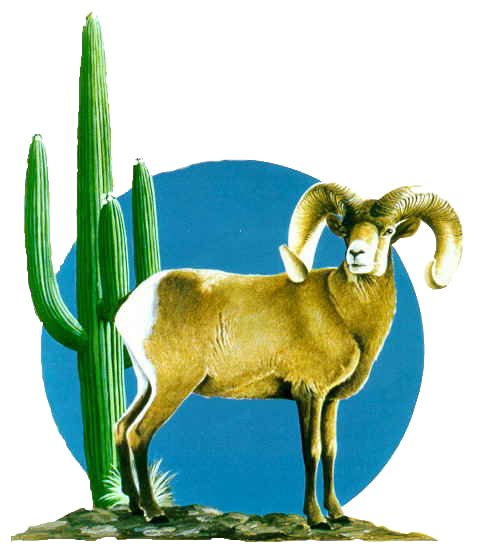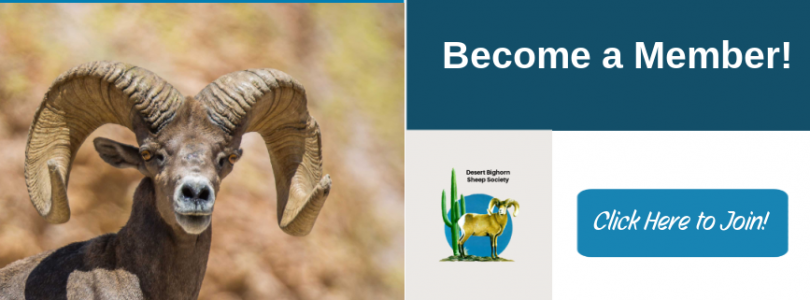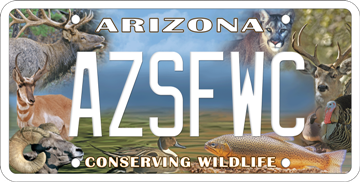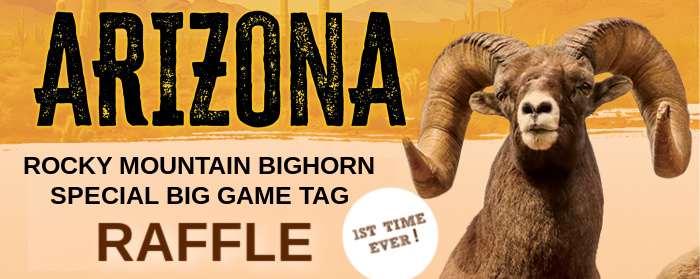
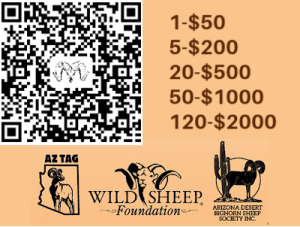
Here’s your chance!
The Wild Sheep Foundation is pleased to offer the 2025 Arizona Game & Fish Commission Rocky Mtn. Bighorn Sheep Raffle Tag.
Buy your raffle tickets today!
100% of the raffle tag proceeds will be directed to the Arizona Game & Fish Department’s
Habitat Partnership Committee for their continued stewardship of the state’s wild sheep resources.
SEASON DATES: AUG 15, 2025 – AUG 14, 2026
In the arid expanse of Arizona’s Harcuvar Mountains, hunter-conservationists have partnered to expand the range’s capacity for desert bighorn sheep. Spearheaded by the Arizona Desert Bighorn Sheep Society (ADBSS) and fueled by a $40,394 Grant-In-Aid from the Wild Sheep Foundation (WSF), the Rinehart-Newlon Water Catchment project stands as a powerful example of what partnerships and passionate volunteers can accomplish.
The WSF Women Hunt® program offers an exceptional opportunity for twelve new female hunters to experience their first hunt in a safe, comfortable, and immersive educational environment at the FTW Ranch in the Hill Country of Texas. The ranch delivers a Field to Fork course and we partnered with them to tailor it for a class of women, incorporating conservation education with the world-class shooting and hunting instruction delivered by former US Special Forces operators and experienced hunters.
The women are matched with a Wild Sheep Foundation Chapter or Affiliate for opportunities for mentorship, volunteering, camaraderie and building relationships. They work with the Women Hunt® committee to meet their obligation to give back to their local community, support other Women in Hunting®, the Women Hunt® program and the Wild Sheep Foundation.
Click photo or scan QR to apply!
Upcoming Events
ADBSS Board Meeting
July 9th, 2025 – 7:00 p.m – Embassy Suites by Hilton Scottsdale Resort (formerly Chaparral Suites Resort), 5001 N. Scottsdale Road, Scottsdale, AZ. Board of Directors meetings are available to all members and anyone interested in bighorn sheep conservation. The meetings are the second Wednesday of every month at 7:00 pm (Except December)

Saturday, October 4, 2025
7:30am-Noon
Embassy Suites Resort
5001 N. Scottsdale Rd. Scottsdale, AZ
There is no charge for the clinic. It will begin at 7:30 am and last until approximately noon. Registration starts at 7:00 am.
The clinic is specifically designed for those who have drawn a 2025 sheep permit and those who will be assisting them on the hunts. Some of the topics to be covered include sheep hunting techniques, how to identify a trophy ram, equipment and optics, photographing the hunt, and field care of your ram.
In addition to the presentations, representatives from the Arizona Game and Fish Department regions, the KOFA and Cabeza Prieta National Wildlife Refuges, the Lake Mead National Recreation Area, and the Bureau of Land Management will be at the clinic to give you some specific information on your particular hunt unit.
To register for the clinic, send an email to the administrative office at admin@adbss.org. Include your name, mailing address, the unit in which you have your tag, and the number of people in your party who will be attending the clinic.
You may also leave this same information on the office voicemail recorder 480-854-8950.
That evening, we will hold our Ram Recognition banquet to honor the 2024 successful sheep hunters, which will also be at Embassy Suites.

Saturday, October 4, 2025
Water Hole 6:00 pm
Dinner 7:00 pm
Program 8:00 pm
Embassy Suites Resort 5001 N. Scottsdale Rd. Scottsdale, Az
Our 2025 Ram Recognition banquet honors those hunters who took rams during the 2024 season and is an excellent chance for you and your family to see outstanding rams displayed in a collective group. Hunters will be able to recognize their guides, taxidermists, and others who assisted on the hunt. Recognition plaques will be awarded to all successful hunters who were members of Society at the start of the hunt season and who returned the advance notice hunter award form. Award forms will be mailed to eligible 2024 hunters in August.
Tickets will go on sale at our website in August.
2025 ADBSS FR Raffle Winners
2025 Chandler Scheels Poor Mans Rifle Raffle
Cody Johnson, Phoenix, AZ
2025 Arrowhead Rifle Raffle
- Aaron Maestes, Corrales, NM
(alt) Tyler Johansen, Peoria, AZ
2025 Shoppers Supply Smoker Raffle
Cody Johnson, Phoenix, AZ
2025 Big 50 Super Raffle
(1) Justin Saccoman | Green | WY |
(2) James Lynch | Scottsdale | AZ |
(3) Dan Acosta | New River | AZ |
(4) Mark Johnson | Waddell | AZ |
(5) James Lynch | Scottsdale | AZ |
(6) Levi Rockhill | Bagdad | AZ |
(7) Justin Barnes | Tehachapi | CA |
(8) Jason Booth | Destin | FL |
(9) Steve Hopkins | Tucson | AZ |
(10) James Lynch | Scottsdale | AZ |
(11) Holden Remfrey | Gilbert | AZ |
(12) Steve Hopkins | Tucson | AZ |
(13) Holden Remfrey | Gilbert | AZ |
(14) Tim Tate | Casa Grande | AZ |
(15) James Lynch | Scottsdale | AZ |
(16) Frank Macias | Buckeye | AZ |
(17) James Lynch | Scottsdale | AZ |
(18) Daren Mallet | Blythe | CA |
(19) Brent Dominy | Phoenix | AZ |
(20) Allen Fehr | Tucson | AZ |
(21) Travis Huerta | Oak Grove | MN |
(22) Steve Cannon | Glendale | AZ |
(23) Jason Foster | Boisse | ID |
(24) Jacob Martin | Mesa | AZ |
(25) Levi Rockhill | Bagdad | AZ |
(26) Joshua Delong | Boise | ID |
(27) James Lynch | Scottsdale | AZ |
(28) Gary Aufrance | Peoria | AZ |
(29) Steve Cannon | Glendale | AZ |
(30) Stacey Gauman | Queen Creek | AZ |
(31) Gary Aufrance | Peoria | AZ |
(32) Ty Hart | Cottonwood | AZ |
(33) James Lynch | Scottsdale | AZ |
(34) Vance Jenkins | Globe | AZ |
(35) Sandra Carpentar | Bagdad | AZ |
(36) David Bennett | Goodyear | AZ |
(37) James Lynch | Scottsdale | AZ |
(38) William Nelson | Defuniak Springs | FL |
(39) Carl Siegfriod | Dewey | AZ |
(40) James Lynch | Scottsdale | AZ |
(41) Jesse Martin | Mesa | AZ |
(42) Levi Rockhill | Bagdad | AZ |
(43) Randy Hopp | Newberg | OR |
(44) Jack Luffy | Scottsdale | AZ |
(45) Justin Barnes | Tehachapi | CA |
(46) Joeseph Giavarra | Austin | AZ |
(47) Randy Hopp | Newberg | AZ |
(48) Terry Taysom | Pocatello | ID |
(49) James Lynch | Scottsdale | AZ |
(50) Dan Mattausch | Tucson | AZ |
(alt1) Douglas Peoble | Oracle | AZ |
(alt2) Brandon Turley | Redmund | OR |
Individuals who are interested in promoting the welfare of bighorn sheep are welcome to join the Arizona Desert Bighorn Sheep Society, Inc. With membership, you will receive our newsletter, Ram’s Horn, which will keep you posted on the Society’s activities. Your moral and financial support is always greatly appreciated. The Society is a 501(c)(3) organization and contributions to the Society are tax deductible as allowable by law.
All memberships (except Life) are on a calendar year, from January 1 through December 31.
